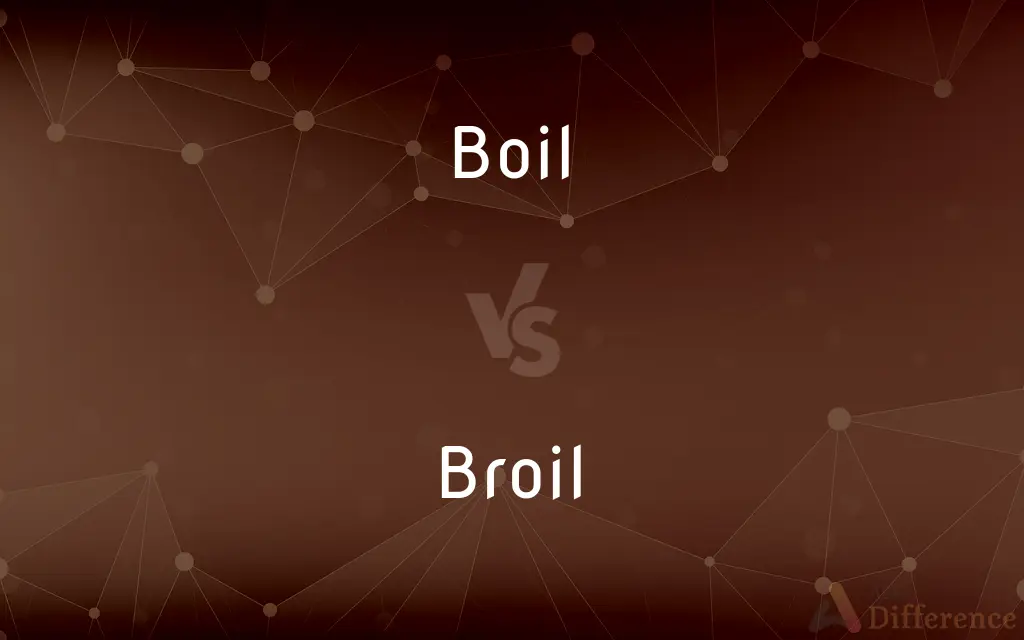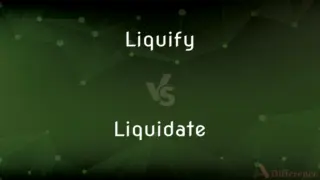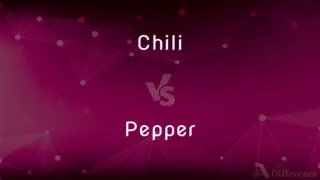Boil vs. Broil — What's the Difference?
By Maham Liaqat & Fiza Rafique — Updated on April 1, 2024
Boiling involves cooking food in water at 212°F (100°C), while broiling uses direct radiant heat from above to cook food quickly.

Difference Between Boil and Broil
Table of Contents
ADVERTISEMENT
Key Differences
Boiling is a cooking method where food is submerged in water or another liquid at a temperature of 212°F (100°C) at sea level. This method is used for pasta, vegetables, and eggs, ensuring even cooking through the convection process in the water. On the other hand, broiling involves cooking food by exposing it to direct radiant heat from above, similar to grilling but with the heat source above rather than below. This method is ideal for quickly cooking thin cuts of meat, vegetables, or fish, creating a charred or crispy exterior while keeping the interior moist.
While boiling is a gentler process that cooks food uniformly but can sometimes lead to a loss of nutrients into the cooking water, broiling is intense and fast, suitable for adding flavor and texture to the surface of food without extensive cooking inside. For instance, boiled carrots might end up softer and lose some vitamins to the water, whereas broiled steak will develop a flavorful crust with a tender inside.
Boiling requires a pot filled with liquid and is considered a moist-heat cooking method, allowing for the preparation of soups, stews, and boiled sweets like candies. Conversely, broiling needs a broiler pan that allows fat to drip away from the food, making it a dry-heat method preferred for quick searing or browning.
The choice between boiling and broiling depends on the desired texture and flavor of the food. Boiling is more forgiving and suitable for foods that benefit from slow, even cooking. Broiling, however, is best for foods that are enhanced by a quick, high-heat method that adds color and flavor through caramelization or charring.
Comparison Chart
Temperature
212°F (100°C) at sea level
High, varies depending on the broiler
ADVERTISEMENT
Cooking Medium
Water or other liquids
Direct radiant heat from above
Method Type
Moist-heat
Dry-heat
Ideal Foods
Pasta, vegetables, eggs
Thin cuts of meat, vegetables, fish
Cooking Process
Even cooking through convection in liquid
Quick, high-heat cooking with a charred exterior
Compare with Definitions
Boil
Boiling is essential for foods that need softening.
Boiling beans before adding them to a chili.
Broil
Suitable for thin cuts of meat or quick-cooking vegetables.
Broiling steak for a seared exterior and tender inside.
Boil
Boiling is cooking food by submerging it in a liquid at its boiling point.
Boiling potatoes for mashed potatoes.
Broil
Requires a broiler pan to allow fat to drip off.
Using a broiler pan for chicken to ensure it cooks evenly and stays moist.
Boil
Boiling can also be used for making broths and soups.
Boiling chicken to make chicken broth.
Broil
It's a quick, dry-heat method for a charred finish.
Broiling peppers until they're charred for a smoky flavor.
Boil
It ensures even cooking but may lead to nutrient loss.
Boiling vegetables can cause vitamins to leach into the water.
Broil
Broiling enhances flavor through caramelization.
Broiling slices of pineapple for a caramelized dessert topping.
Boil
It's a moist-heat method suitable for starches and legumes.
Boiling pasta until it's al dente.
Broil
Broiling involves cooking food with direct heat from above.
Broiling salmon to get a crispy skin.
Boil
(with reference to a liquid) reach or cause to reach the temperature at which it bubbles and turns to vapour
We asked people to boil their drinking water
He waited for the water to boil
Broil
Cook (meat or fish) by exposure to direct heat
A broiled sirloin steak
He lightly broiled a wedge of sea bass
Boil
(with reference to food) cook or be cooked by immersing in boiling water or stock
Make the sauce while the lobsters are boiling
Boil the potatoes until well done
Broil
A quarrel or commotion
The dark interior was a broil of fighting men
Boil
(of the sea or clouds) be turbulent and stormy
A huge cliff with the black sea boiling below
Broil
To cook by direct radiant heat, as over a grill or under an electric element.
Boil
The temperature at which a liquid bubbles and turns to vapour
Bring the sauce to the boil and simmer for 10 minutes
Broil
To expose to great heat.
Boil
A casual outdoor meal at which shellfish is prepared by boiling
The reappearance of warm days signals another revival: weekend crawfish boils
Broil
To be exposed to great heat.
Boil
An inflamed pus-filled swelling on the skin, caused typically by the infection of a hair follicle.
Broil
To engage in a rowdy argument.
Boil
To change from a liquid to a vapor by the application of heat
All the water boiled away and left the kettle dry.
Broil
The act of broiling or the condition of being broiled.
Boil
To reach the boiling point.
Broil
Food, especially meat, that is broiled.
Boil
To undergo the action of boiling, especially in being cooked.
Broil
A rowdy argument.
Boil
To be in a state of agitation; seethe
A river boiling over the rocks.
Broil
To cook by direct, radiant heat.
Boil
To be stirred up or greatly excited, especially in anger
The mere idea made me boil.
Broil
To expose to great heat.
Boil
To vaporize (a liquid) by the application of heat.
Broil
To be exposed to great heat.
Boil
To heat to the boiling point.
Broil
(transitive) To cause a rowdy disturbance; embroil.
Boil
To cook or clean by boiling.
Broil
To brawl.
Boil
To separate by evaporation in the process of boiling
Boil the maple sap.
Broil
Food prepared by broiling.
Boil
The condition or act of boiling.
Broil
(archaic) A brawl; a rowdy disturbance.
Come to broils
Boil
Lower Southern US A picnic featuring shrimp, crab, or crayfish boiled in large pots with spices, and then shelled and eaten by hand.
Broil
A tumult; a noisy quarrel; a disturbance; a brawl; contention; discord, either between individuals or in the state.
I will own that there is a haughtiness and fierceness in human nature which will which will cause innumerable broils, place men in what situation you please.
Boil
An agitated, swirling, roiling mass of liquid
"Those tumbling boils show a dissolving bar and a changing channel there" (Mark Twain).
Broil
To cook by direct exposure to heat over a fire, esp. upon a gridiron over coals.
Boil
A painful, circumscribed pus-filled inflammation of the skin and subcutaneous tissue usually caused by a local staphylococcal infection. Also called furuncle.
Broil
To subject to great (commonly direct) heat.
Boil
A localized accumulation of pus in the skin, resulting from infection.
Broil
To be subjected to the action of heat, as meat over the fire; to be greatly heated, or to be made uncomfortable with heat.
The planets and comets had been broiling in the sun.
Boil
The point at which fluid begins to change to a vapour; the boiling point.
Add the noodles when the water comes to the boil.
Broil
Cooking by direct exposure to radiant heat (as over a fire or under a grill)
Boil
A dish of boiled food, especially based on seafood.
Broil
Cook under a broiler;
Broil fish
Boil
The collective noun for a group of hawks.
Broil
Heat by a natural force;
The sun broils the valley in the summer
Boil
A bubbling.
Boil
To heat to the point where it begins to turn into a gas.
Boil some water in a pan.
Boil
(ambitransitive) To cook in boiling water.
Boil the eggs for three minutes.
Is the rice boiling yet?
Boil
To begin to turn into a gas, seethe.
Pure water boils at 100 degrees Celsius.
Boil
To bring to a boil, to heat so as to cause the contents to boil.
Boil
To be uncomfortably hot.
It’s boiling outside!
Boil
To feel uncomfortably hot.
I’m boiling in here – could you open the window?
Boil
(transitive) To form, or separate, by boiling or evaporation.
To boil sugar or salt
Boil
(obsolete) To steep or soak in warm water.
Boil
To be agitated like boiling water; to bubble; to effervesce.
The boiling waves of the sea
Boil
To be agitated, or tumultuously moved, as a liquid by the generation and rising of bubbles of steam (or vapor), or of currents produced by heating it to the boiling point; to be in a state of ebullition; as, the water boils.
Boil
To be agitated like boiling water, by any other cause than heat; to bubble; to effervesce; as, the boiling waves.
He maketh the deep to boil like a pot.
Boil
To pass from a liquid to an aëriform state or vapor when heated; as, the water boils away.
Boil
To be in boiling water, as in cooking; as, the potatoes are boiling.
Boil
To heat to the boiling point, or so as to cause ebullition; as, to boil water.
Boil
To form, or separate, by boiling or evaporation; as, to boil sugar or salt.
Boil
To subject to the action of heat in a boiling liquid so as to produce some specific effect, as cooking, cleansing, etc.; as, to boil meat; to boil clothes.
The stomach cook is for the hall,And boileth meate for them all.
Boil
To steep or soak in warm water.
To try whether seeds be old or new, the sense can not inform; but if you boil them in water, the new seeds will sprout sooner.
Boil
Act or state of boiling.
Boil
A painful sore with a hard pus-filled core
Boil
The temperature at which a liquid boils at sea level;
The brought to water to a boil
Boil
Come to the boiling point and change from a liquid to vapor;
Water boils at 100 degrees Celsius
Boil
Cook in boiling liquid;
Boil potatoes
Boil
Bring to, or maintain at, the boiling point;
Boil this liquid until it evaporates
Boil
Be agitated;
The sea was churning in the storm
Boil
Be in an agitated emotional state;
The customer was seething with anger
Common Curiosities
Is one method healthier than the other?
Broiling can be considered healthier as it allows fat to drip away from the food and retains more nutrients, whereas boiling may lead to nutrient loss in the cooking water.
Can boiling and broiling be used for the same foods?
While some foods can be both boiled and broiled, the methods are best suited for different types of food, with boiling for softer foods and broiling for foods that benefit from a crisp exterior.
Do boiling and broiling require special equipment?
Boiling requires a pot and sufficient water, while broiling needs a broiler and a broiler pan to catch drips and allow heat circulation.
What safety precautions should be taken when broiling?
Keep a close eye on food due to the high heat, maintain a safe distance between the food and the heat source, and use appropriate broiler-safe cookware.
What is the main difference between boiling and broiling?
Boiling cooks food in liquid at 212°F, while broiling uses direct heat from above for quick cooking and a charred surface.
How can I prevent nutrient loss when boiling vegetables?
Minimize cooking time, use less water, or steam to preserve more nutrients compared to fully submerging and boiling.
How do you know when to boil or broil food?
Choose boiling for gentle cooking and even softness, like for pasta or vegetables, and broiling for a quick, flavorful crust on meats or vegetables.
Can I broil with an electric oven?
Yes, many electric ovens have a broil setting, but it's important to check your oven's manual for specific broiling instructions.
Is broiling suitable for all types of meat?
Broiling is best for thinner cuts of meat that cook quickly; thicker cuts may burn outside before cooking through.
Is it possible to over-boil food?
Yes, over-boiling can make food too soft, mushy, and may lead to significant nutrient loss.
How does broiling differ from grilling?
Broiling applies heat from above, while grilling applies it from below. Both methods involve direct heat but differ in equipment and heat source placement.
How does altitude affect boiling?
At higher altitudes, water boils at lower temperatures due to decreased air pressure, potentially lengthening cooking times.
Can boiling affect the taste of food?
Yes, boiling can dilute flavors and lead to nutrient loss, sometimes making food less flavorful than broiling, which enhances taste through caramelization.
What are some common mistakes when boiling or broiling?
Common mistakes include overcooking when boiling, leading to mushy textures, and not monitoring closely when broiling, which can quickly lead to burning.
Can you broil in a toaster oven?
Many toaster ovens have a broil function, suitable for small servings or items that fit well in the appliance.
Share Your Discovery

Previous Comparison
Liquify vs. Liquidate
Next Comparison
Chili vs. PepperAuthor Spotlight
Written by
Maham LiaqatCo-written by
Fiza RafiqueFiza Rafique is a skilled content writer at AskDifference.com, where she meticulously refines and enhances written pieces. Drawing from her vast editorial expertise, Fiza ensures clarity, accuracy, and precision in every article. Passionate about language, she continually seeks to elevate the quality of content for readers worldwide.















































